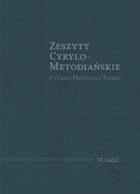Toponymic Components in Czech, Serbo-Croatian and Bulgarian Propositional and Polypropositional Phrasemes
TOPONYMIC COMPONENTS IN CZECH, SERBO-CROATIAN AND BULGARIAN PROPOSITIONAL AND POLYPROPOSITIONAL PHRASEMES.
Author(s): Pavel KrejčíSubject(s): Language and Literature Studies, Theoretical Linguistics, Phraseology
Published by: Wydawnictwo Naukowe Uniwersytetu Marii Curie-Sklodowskiej
Keywords: Bulgarian phraseology; Serbian / Croatian phraseology; Czech phraseology; contrastive phraseology; toponyms in phraseology; proverbs and sayings
Summary/Abstract: The paper presents toponyms that appear in the function of components of Bulgarian, Serbo-Croatian and Czech phraseological units in a form of a sentence (traditionally also refeered to as proverbs and sayings). From the point of view of their syntactic structure, most examples follow the pattern of a simple sentence (e.g. S.-Cr. Puno je vode proteklo Savom), a less complex sentence (e.g. Bulg. Ходил в/на Стамбул, а царя не видял), while exceptions constitute the so-called intersubject structures, such as Czech Jak je ti, Rakousko? – Ouzko!. The syntactic structure may lack a predicate – e.g. Bulg. Нерде Ямбол, нерде Стамбул or S.-Cr. Martin u Zagreb, Martin iz Zagreba. Within the studied phraseology there are also toponyms differing from their standard or modern form (e.g. Czech Tejn, Brandejs, Sibérie or Bulg. Стамбул).
Journal: Zeszyty Cyrylo-Metodiańskie
- Issue Year: 10/2021
- Issue No: 1
- Page Range: 66-75
- Page Count: 10
- Language: Czech, Polish

